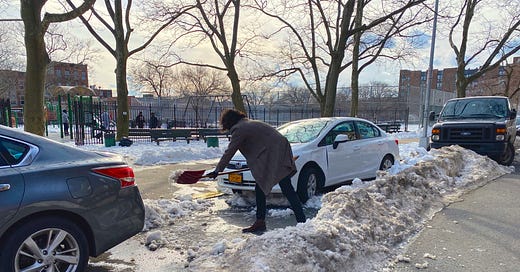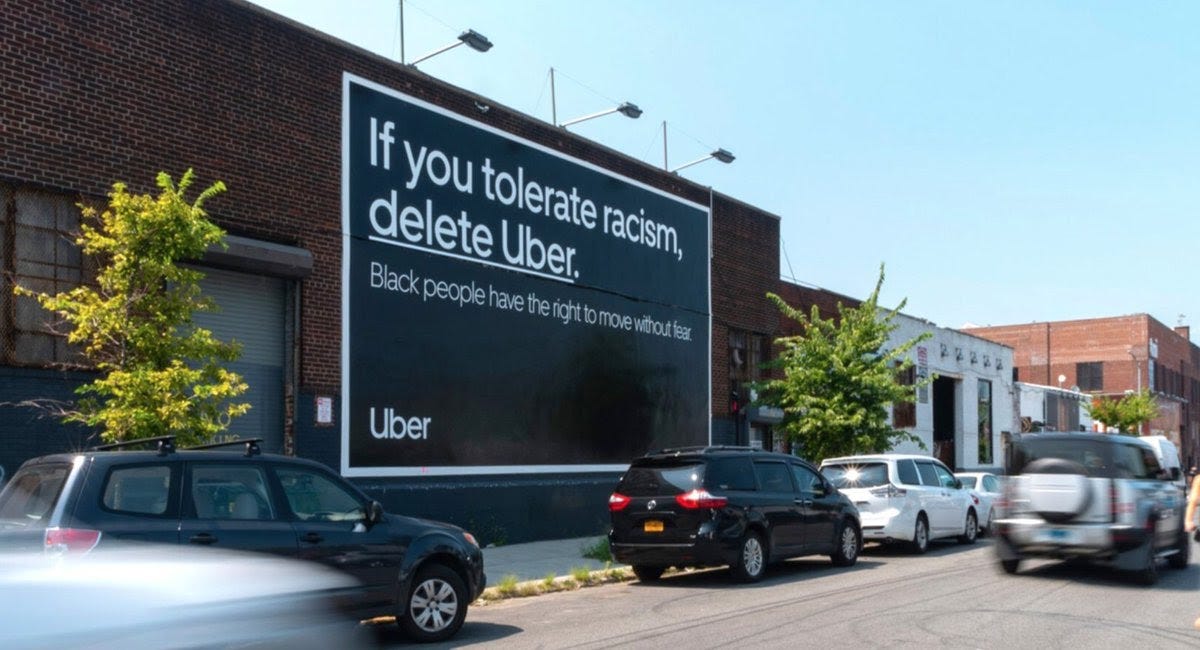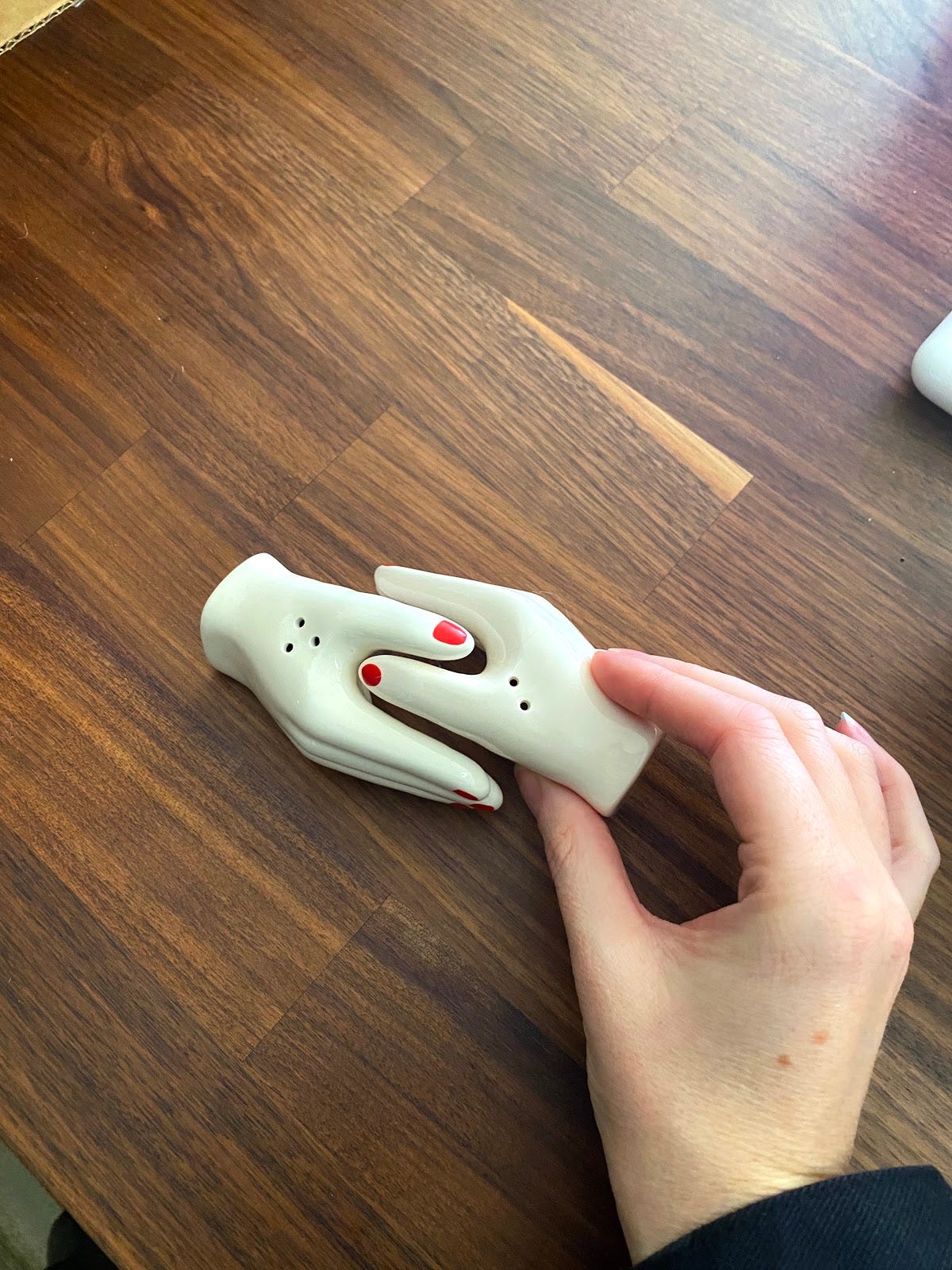Maybe Baby is a free Sunday newsletter. If you love it, consider supporting it financially. For $5/mo, you’ll gain access to my monthly advice column, Dear Baby, as well as my Tuesday weekly podcast. Thank you! (You’ll never see an ad either way.)
Good morning!
Last week Avi and I went outside to unbury our car after the storm, a task we assumed we could do ourselves but ultimately involved our whole neighborhood. First we asked our bodega guy if we could borrow his shovel. He was in the middle of something but waved me off like, of course, why even ask? So we returned to our car and started digging. Thirty minutes later, our progress was laughable, our car still completely trapped. Then a man ran out of a nearby building and asked if it would help if he moved his car, which was parked in front of ours. We nearly cried with gratitude, as it would allow us to drive straight rather than turn into the snow bank. He waved us off too. After he drove away, we tried to inch our car forward, but nothing. It was beached, wheels turning furiously in their respective slush puddles. We dug some more. Finally, another man stopped his car in the middle of the street, clearly in a hurry, and insisted on helping us. He offered no hello, merely stormed into the situation and barked orders at us—drive forward! now rock back! now turn your wheel all the way to the right!—until our car miraculously lurched forward, at which point he hurried unceremoniously back to his car and drove off.
I recently saw a tweet by someone named Jordan Green that claimed East Coasters are kind but not nice, while West Coasters are nice but not kind. To explain, Green wrote: “Niceness is saying ‘I'm so sorry you're cold,’ while kindness may be ‘Ugh, you've said that five times, here's a sweater!’ Kindness is addressing the need, regardless of tone.” Obviously New Yorkers love this kind of take, even if it doesn’t apply to their shitty personality. (It’s worth noting Green is a proud West Coaster.) No one wants to be the saccharine asshole; everyone wants to be the humble hero, at least in theory. Beyond the geographic distinction, accurate or not, I found his framing of the qualities useful. Green went on to explain how niceness-versus-kindness translates to institutional politics—the focus on woke signaling via language and optics (nice) versus material concerns like who has food, shelter, safety, agency (kind). Broadly, this reflects my shorthand for what differentiates liberals from leftists: the former prioritizing niceness, the latter kindness. Of course, leftists love this kind of take, even if it doesn’t apply to their shitty personality.
I thought of Green’s tweet when that man helped us unstick our car. His simultaneous gruffness and generosity. How he was late to wherever he was going and still stopped. How he expected nothing in return for his help, not even our gratitude. And the other men, too. They made us want to reciprocate or pass on whatever it is they’d given us, and in that way reminded us what it means to live in a community. The goal being collectivism versus luxury, ease, or pleasantries. To state the obvious, this is the New York people fear is being replaced by super-cheap delivery services and Instagrammable coffee shops and street murals sponsored by Chase.



The other day I was watching the second season of Blown Away, the competitive glass-blowing show on Netflix that is somehow more than its busted composite parts. But one thing I find grating about it is its persistent emphasis on feminism. The women glass-blowers draw constantly on their otherness, and even view their victories as subversions to oppression. I don’t doubt their experiences—men dismissing their skill, outnumbering them—and I’m sure producers and editors are colluding to present them this way to make the show seem somehow politically necessary. But the emphasis reminds me of niceness versus kindness in the sociopolitical sphere. The most marketable version of feminism implies the central female struggles are things like rudeness or feeling left out or bad movie roles. In other words, the version of sexism that affects women of a certain class, especially white women of a certain class. But while complicated protagonists and representation in glass-blowing competitions are certainly nice for the female cause, they do little to help lift poor women out of poverty, or give them agency or protection. In essence, they address symptoms rather than the problems that caused them. Shone through the nice-kind prism, you might say “nice” feminism addresses wants, and “kind” feminism addresses needs.
I think the same could be said for the commercialized version of anti-racism that’s been embraced by brands both personal and corporate. The kind that emphasizes microaggressions and representation over social and economic emergencies. Politically speaking, niceness is good, but kindness is urgent. Clapping for essential workers is nice, paying them a liveable wage is urgent. Using the right pronouns is nice; ensuring rights, safety, and protection for trans people is urgent. “Nothing happens after the pronoun check-ins and the icebreakers,” Green, who is Black and non-binary, wrote. “It's rare we make sure that people's immediate needs are addressed.” It’s not that all these things aren’t worth fighting for (and they’re not entirely isolated, either), but when people of means are given the microphone, calls for niceness have a way of drowning out calls for kind ones. Perhaps because by assuming that everyone is equally victimized, or that clapping is enough, more people get to skirt accountability, or feel like heroes. This is how issues like the income gap somehow become a Hollywood problem. Or taken to an extreme, racism is addressed by appointing a Black defense secretary with ties to mass weapon-maker Raytheon. (As Keeanga-Yamahtta Taylor wrote for The New Yorker, there are limits to representation.) In other words, it’s optics.
That political discourse seems increasingly centered around niceness instead of kindness makes sense when you consider where the discourse is taking place. On social media, it’s easier to perform your politics through aesthetics, hashtags, or snappy lines of argument; your actual behavior being almost inconsequential, or worse, irrelevant. Click-driven headlines more often reflect bigwig PR campaigns (“The President has created a committee to solve the problem”) than on-the-ground consequences (“The President has not solved the problem”). In million-dollar ad spots and “political” fashion shows and Oscar speeches, it’s almost impossible to meaningfully address the name-checked causes because progress usually stands in direct opposition to the delivery apparatus. Since the birth of mass media, these contradictions have only intensified. It’s a big circle-jerk with no climax. Adam Curtis might call it hypernormalization.
When the photo of Bernie Sanders sitting dispassionately at the inauguration went viral, there was a contingent of liberals who found his posture disrespectful. There were some controversial Twitter threads claiming that he was abusing his white male privilege by dressing plainly and appearing cold. Nevermind that Sanders has dedicated his entire career to fighting for the rights and wellness of poor and marginalized people, it was the fact that he wasn’t showing enough performative reverence to Joe Biden and Kamala Harris that is the most telling of his character. To be fair, I cherry-picked this example for its particular absurdity, but I think it’s the perfect encapsulation of a political framework centered around optics over material concerns. It’s happening more subtly all the time.
When I started writing for a women’s culture website in my mid-twenties, I knew my feminism needed to be intersectional. I understood and believed that women of color faced unique and additional challenges in their womanhood than I did, but the focus of my work remained fairly divorced from policy. Low self-esteem, over-apologizing, emotional labor—these problems existed in the social realm, and I wrote about them because I faced them myself. But no matter how dramatically I rolled my eyes at the term girlboss, in many ways I was still embodying its ethos: that change should take place in the mind, that personal empowerment was the missing piece. It’s not that those issues weren’t and aren’t important, it’s that by overemphasizing them, I was inadvertently pushing for solutions that only addressed the most privileged, or the concerns of individuals over populations. In my view, this is where mainstream feminism went so wrong, and mainstream activism, too.
Maybe that’s why I feel so intent on crystalizing the distinction between nice politics and kind: my own sense of shame. If I were to describe my personal political arc, it would entail me learning this lesson over and over, often stumbling. The biggest gift leftist thought has given me is teaching me to see beyond myself and helping me divorce my sense of morality from saying the right thing, being seen as a good person, or being on the right side. The central tenet is always material and systemic change for the most vulnerable. Not everyone will see leftist politics this way, but I’ve found it grounding and humbling. It’s also easier to track progress: the wealth gap is widening, people are dying, the war machine keeps grinding. Perfectly worded tweets aren’t up to the task of solving anything. When contestants on (dare I mention it again) Blown Away hammer a feminist agenda, I cringe because it reminds me of my early writing days, or an uplifting Super Bowl ad. It’s not the women’s fault for expressing their honest experiences, but the tenuous line between their game-show victory and systemic change feels so individual, so nice, so pathetic. It only serves as a reminder of the false utopian promise made by so many other branded progressive efforts, from lean-in feminism to corporate diversity training. It’s like being trapped in a hypernormal universe: a sparkly, backwards world where a woman in a Marvel movie is more inspiring than a call for national rent relief.
The nice-kind distinction feels a little corny, but maybe that’s why it works. These terms are accessible and evocative. We all know what it means to be nice and to be kind; we’ve all been lectured by someone at some point about how they aren’t actually synonyms. The metaphor isn’t perfect, but I think it works on the level of assuming niceness is about tone, and kindness is about need. Which is to say, tone isn’t irrelevant, but imagine if it were everything? No matter how nice is it for a passerby to offer a wave of sympathy as I dig out my car, I’m going to pick the gruff guy who helps me unbury it every time.
1. Another season of Blown Away…fuck me up I guess!
2. The Low End Theory, a 1991 album by A Tribe Called Quest that Avi and I have a CD of in our car. It’s very good especially because it’s on a CD.
3. “You Are Not a Loan,” a 45-minute documentary by debt activist Astra Taylor about student debt, published by The Intercept. It’s crushing, enraging, activating, hopeful—all the emotions you expect from effective organizing. When you really start asking yourself about college and unpacking the ingrained attitudes around education in modern society, it’s startling how much bullshit you have to wade through and unlearn to get to anything true.
4. 3 TGIF mozzarella sticks (from frozen aisle) and 5 bagel bites, neither of which I can ultimately recommend.
5. “Against Loving Your Job,” a great essay by Sarah Jaffe for In These Times about why “loving” our jobs should not be the goal of reimagining our toxic relationship to work. In addition to fighting for better work conditions and policies, we need to build “a politics of time”—“a political understanding that our lives are ours to do with what we will.”
“People have tried to blame the internet for our collective loneliness, but in fact it comes alongside the change in our working lives and the decline of unions and other institutions that gave people a sense of shared purpose and direction beyond just the job.”
6. This Quora thread about the real meaning of the children’s nursery rhyme “This Little Piggy.” I’m laughing….what the fuck.
7. “Chloe Zhao’s America,” a profile of an up-and-coming film director by Alison Willmore for Vulture that is as good as people are saying it is on Twitter. It also uses the word “miserablism,” which I love.
8. These salt and pepper shaker hands from a retailer on Etsy called VintageBakelight4U (love it), which I enjoy so much I’ve started making pit stops in the kitchen just to look at them.
9. “A Breakup Letter to My Writing Career,” by Francesco Pacifico for N+1, which made me want to write a letter to my worst neuroses.
“You want [me] to be steady and reliable even at moments like this one. Do you think [I] don’t grasp the irony? The reason you fell for [me] in the first place is that [I] managed to be unsteady and unreliable even in the most stable and predigested situations.”
10. This thought-provoking tweet.
11. “Living With a Visionary,” a beautiful, heartbreaking essay by John Matthias for The New Yorker about his wife’s deteriorating mental health.
“In the house, nothing held still: objects danced on the mantel, the ideograms on our hanging scroll of Chinese calligraphy flew around like butterflies. At the beginning, many of these transformations had given her pleasure. More and more, however, they annoyed and alarmed her.”
12. The first (and only) season of A Teacher, a show starring Kate Mara on Hulu about a student who gets involved with her student. I think it’s so well-done—gave me complicated and then harrowing feelings—and as Hunter Harris mentioned in a recent newsletter, the music is really good.
13. “Welcome to the Jerk Pit,” by Jess Zimmerman for her newsletter, Dead Channel, about the loss of “third spaces”—meaning where we go when we aren’t home (our first place) or at work (our second place).
“Third places are supposed to be neutral and pleasant, but at the same time, any crucible of community contains implicitly within itself the possibility of rift, disappearance, estrangement. Even if it’s never realized, it’s there, the way death lurks in every wedding vow.”
14. This tour of Devendra Barnhart’s house in LA. I love him?
15. Lastly, my episode of my friend Catherine Saint Siena’s podcast KTR, where we talk about art, movies, relationships, and New York.
Ok ok that’s all. Thanks for reading!
Haley
This month a portion of subscriber proceeds will be redistributed to Jobs With Justice, a grassroots nonprofit leading strategic campaigns to fight for workers’ rights and build power for working people.
Give me feedback • Subscribe • Request a free subscription • Ask Dear Baby a question












